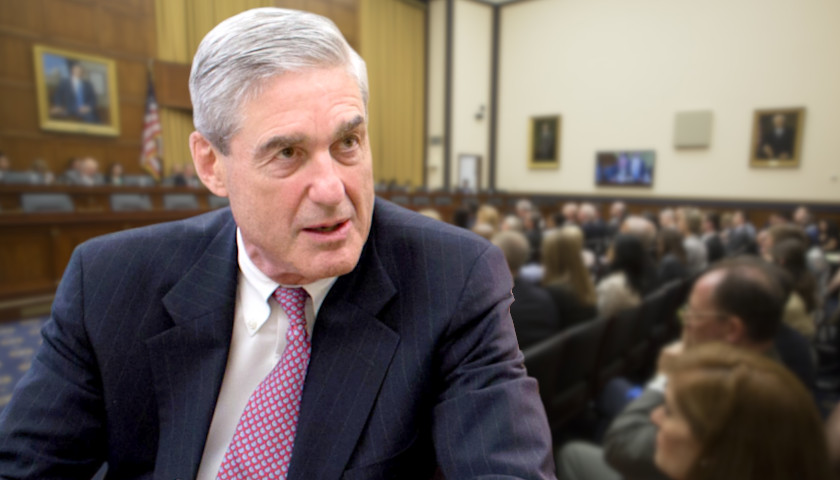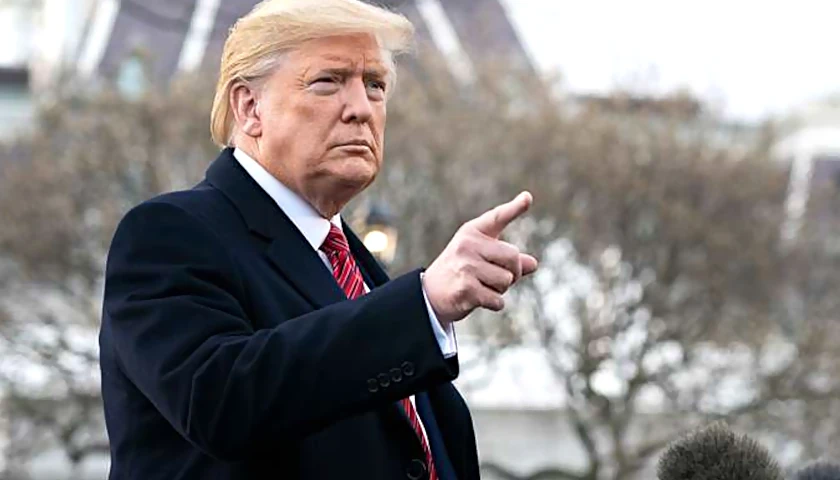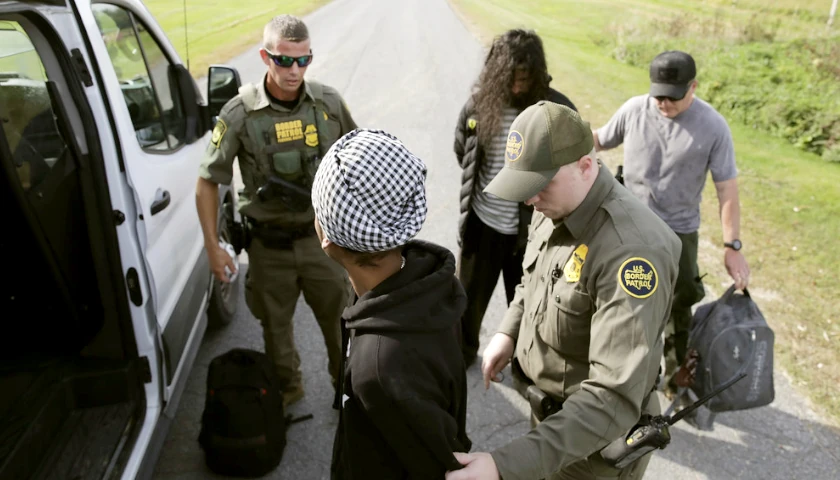by Julie Kelly
Republicans will have a chance to redeem themselves this week after the farce they helped create: The special counsel investigation into alleged “collusion” between Russia and the Trump campaign to influence the 2016 presidential election.
Robert Mueller is scheduled to testify before the House Judiciary Committee and the House Intelligence Committee in a public hearing for a total of five hours on Wednesday—not nearly enough time to plumb the depths of his 448-page report or to grill Mueller about his tactics and partisan team of investigators. Republicans will need to make the most of the limited time they have.
So, this seems like an appropriate time to remind Republicans that they are as much to blame as Democrats for foisting this costly, useless and destructive travesty on the American people.
With few exceptions, Republicans capitulated to every single Democratic demand and the ongoing media-manufactured hysteria about the urgency required to investigate so-called “election collusion.”
“Some of us very early on saw enormous conflicts [with Mueller], even conflicted as being a witness. We knew there was something wrong,” U.S. Representative Andy Biggs (R-Ariz.), one of the few Republicans skeptical of the Mueller probe from the beginning, told me on Monday. “But once the inspector general report came out and revealed the bias and corruption at the top of DOJ and FBI, we started getting help.”
But Republicans should have been wary before Michael Horowitz released his report in June 2018. By the time Robert Mueller was appointed in May 2017, Republicans on Capitol Hill knew that the collusion accusation had been concocted by Obama loyalists in the government and Democratic political operatives.
Republicans knew that former FBI Director James Comey had been investigating the Trump campaign since July 2016 and tried to hide it from congressional leaders in violation of normal protocol.
Republicans knew that the so-called “dossier” authored by Christopher Steele was loaded with unsubstantiated allegations and that Steele was working on opposition research paid for by anti-Trump partisans. Republicans knew that law enforcement and intelligence officials were illegally leaking classified information to the media to bolster the collusion storyline.
Republicans also knew that Obama holdovers had attempted to criminalize phone calls between Michael Flynn and the Russian ambassador with ludicrous accusations about Logan Act violations to animate the collusion fantasy.
Yet despite the backdrop of malfeasance, most Republicans caved to pleas for a special counsel and defended the appointment of a clearly-conflicted Robert Mueller. (Mueller and Comey have been friends for nearly two decades.) Top GOP lawmakers in the House and Senate, including former Speaker of the House Paul Ryan (R-Wis.), slobbered over Mueller, greenlighting what would turn out to be a sham inquiry that essentially robbed Trump of the first two years of his presidency.
When Mueller’s lengthy report was finished in March, it confirmed what a handful of independent observers—and the president—knew: There was no conspiracy between the Trump campaign and the Kremlin to sway the outcome of the 2016 presidential election. But to divert from their failed mission and fuel the Democrats’ impeachment crusade, Mueller’s report outlined several instances of alleged obstruction of justice by the president
House Democrats will hammer Mueller on the obstruction of justice section of the report, hoping for digestible soundbites to leverage in 2020. House Republicans need to follow their own script and resist playing into the Democrats’ hands. There are plenty of questions that Republicans could ask Mueller to expose the roots of the fruitless inquiry and numerous flaws in the report.
Republican members, however, would be wise to focus on two key controversies: The June 2016 Trump Tower meeting and Trump’s alleged efforts to shut down the investigation into former National Security Advisor Michael Flynn. The media and the special counsel continue to mischaracterize those storylines, omitting crucial details and conflating separate circumstances to present an inaccurate depiction of both.
The Trump Tower Meeting
The June 2016 Trump Tower meeting is the most scrutinized campaign briefing in the history of American politics. Yet it appears the whole thing was a set-up perpetrated by the very same folks who produced the so-called Steele dossier. And since Team Mueller investigated the meeting, including whether it violated campaign finance laws, it’s fair game.
Further, recent comments by developer Felix Sater, a subject of the investigation, suggest that Glenn Simpson, co-founder of Fusion GPS, committed perjury when he claimed that Sater was the reason his firm began looking into Trump’s ties to the Kremlin.
“It actually was the fact he was working for [Natalia] Veselnitskaya, I don’t know if anybody knows that, but he’d been working with her for quite some time,” Sater told reporters on July 14.
If the name “Veselnitskaya” sounds familiar, it’s because she is the infamous Russian lawyer who attended the June 2016 meeting with Donald Trump, Jr. and other top campaign officials. (This is a good time to note that the Mueller report does not mention Simpson or Fusion GPS anywhere in those hundreds of pages.) In the Mueller report, Veselnitskaya is described as a “Russian attorney who advocated for the repeal of the Magnitsky Act and was the principal speaker at the June 9, 2016 meeting at Trump Tower.”
Mueller intentionally omitted the fact that Veselnitskaya was working with Simpson to lobby the U.S. government on behalf of Prevezon, a Russian holding company accused of violating the Magnitsky Act. Mueller omitted mentioning that Simpson had dinner with Veselnitskaya on June 8 in New York City and on June 10 in Washington, D.C. Mueller also omitted mentioning that Simpson was in court with Veselnitskaya in New York City just hours before the dastardly Trump Tower meeting.
This sham could be exposed with two questions: “Mr. Mueller, did you investigate collusion between the Hillary Clinton campaign and the Russians since Mr. Simpson was working for both the Clinton campaign and a Russian company? Do you suspect that the meeting between Trump campaign officials and lobbyists working with Glenn Simpson was a set-up to advance the Russian collusion narrative that Simpson was concocting before the election to impact its outcome?”
The Flynn Matter
One of the most egregious sleights-of-hand in the Mueller report is the distorted portrayal of the Michael Flynn matter in order to concoct the most credible case of Trump attempting to obstruct justice.
Mueller repeatedly referred to the “Russia investigation” as it related to Flynn, an intentionally vague description intended to conflate three separate inquiries: The general investigation into Russia election meddling, the Trump-Russia collusion investigation, and the FBI’s investigation into whether Flynn violated the Logan Act in his conversations with Russian Ambassador Sergei Kislyak (another shady character I have covered at American Greatness.)
According to Comey’s personal memos, on Feb. 14, 2017, Trump mentioned the possibility of “letting Flynn go.” Trump clearly was referring to the FBI’s ridiculous Logan Act probe; Comey sent two FBI agents to ambush Flynn in the White House a few days after the inauguration and interrogate him about the Kislyak calls. Justice Department officials met with Trump’s personal lawyer in late January to alert the White House that Flynn possibly violated the Logan Act, a so-called dead letter law that is on the books but never used.
So when Trump referred to the Flynn “thing,” he meant the Logan Act investigation, not the collusion investigation. Nonetheless, Mueller suggested on page 44 of Volume II that Trump’s comment could constitute obstruction “by shutting down an inquiry that could result in a grand jury investigation and a criminal charge.”
Now, your average reader or Hollywood actor would easily interpret this as an effort by Trump to shut down the collusion investigation into Flynn. The only problem is that Comey did not disclose the FBI’s investigation into the Trump campaign, which included Flynn, until March 2017, one month after Flynn resigned and one month after Trump purportedly made his “let this go” remark. Comey withheld that explosive news from both the president and congressional leaders for months.
House Republicans need to press Mueller on this point: “Mr. Mueller, according to Comey, when Trump asked him to let the Flynn matter go, to what specifically was Trump referring?” If Mueller claims the president was referring to the collusion investigation, lawmakers need to clarify when Trump was made aware of the probe known as “Crossfire Hurricane” that targeted Flynn.
If Mueller replies that it referred to the Logan Act investigation, after a hearty laugh, House Republicans should ask Mueller for a history of grand jury investigations based on an ancient law that has never been used to prosecute anyone.
It’s impossible to gauge the price in terms of tax dollars, legal fees, professional reputations, personal well-being, political capital, and domestic strife inflicted by the Mueller investigation. But now Republicans can exact a small measure of retribution by discrediting the most controversial claims about both collusion and obstruction of justice. Democrats appear to be having second thoughts about Mueller’s public performance. Republicans should make them regret it.
– – –
Julie Kelly is a political commentator and senior contributor to American Greatness. Her past work can be found at The Federalist and National Review. She also has been featured in the Wall Street Journal, The Hill, Chicago Tribune, Forbes, and Genetic Literacy Project. After college graduation, she served as a policy and communications consultant for several Republican candidates and elected officials in suburban Chicago. She also volunteered for her local GOP organization. After staying home for more than 10 years to raise her two daughters, Julie began teaching cooking classes out of her home. She then started writing about food policy, agriculture, and biotechnology, as well as climate change and other scientific issues. She graduated from Eastern Illinois University in 1990 with a degree in communications and minor degrees in political science and journalism. Julie lives in suburban Chicago with her husband, two daughters, and (unfortunately) three dogs.





